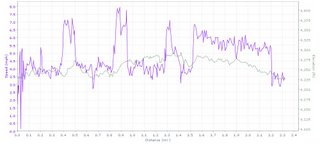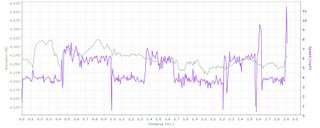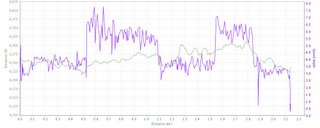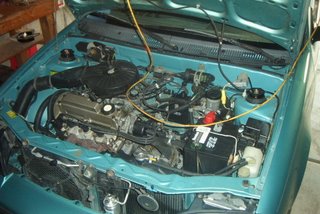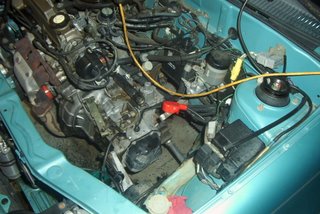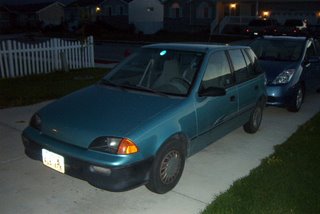Well, today I have spent most of my time contemplating the ultimate question AC or DC. For those of you not electrically savvy. AC is alternating current, this is what you get in your house and what runs down the electrical wires on the street. DC is direct current, this is what you find in batteries and solar panels. No matter what, the batteries in the car will store DC electricity. (AC is nearly impossible to store by a chemical means). The question is what type of power should I use to run the electric motor. Either solution will require a controller, that interprets the throttle pedals position and accordingly powers the motor. They both have advantages and disadvantages. I'll take a minute to explain, then maybe we can have a vote and see what you all think.
DC: Direct Current. The electricity only flows in one direction, out of the negative pole of the battery and into the positive. This is very easy to store chemically, picture a battery that is just extra packed with electrons, these electrons flow out and thus create electricity. However if there is no place for the electrons to go, they simply stay in the battery. This is how the car will store electricity, in batteries. The DC motor always runs on the same voltage. In order to make it go faster or slower, you simple turn the power on and off in a pattern. Example if you put the power on full time the motor will turn with maximum speed and torque. However if you quickly turn the power on and off, the motor will turn with half power. If you turn the power on for 1/10 of each second the motor will turn at 1/10 power, see the pattern. The controller simply turns the power on and off very fast depending on the demand you ask for. This type of controller is fairly simple, and small. These controllers are also fairly inexpensive (maybe $800 for one I could use in the car). The disadvantages are that these are not as efficient at using the energy, typically only 85-90% of the energy gets turned into motion (compare that to 20% for an ICE) Also the engine wants to run within specific speed ranges. At 0 RPM you get maximum torque, but it drops off as the engine speeds up. At high speeds the engine gets inefficient as the contacts start to arc.
pro's: cheap, light, simple, used in about 95% of personal EV conversions
Cons: inefficient, simple controller cannot do much except run motor
AC: Alternating Current. The current flows back and forth rapidly. In AC the actual electrons never move anywhere, they just move back and forth, this is why you cannot store AC power. An AC power curve looks like a sine wave (going up and down over and over). This type of electricity is easy to generate (simply put a magnet on a spinning wheel with wires wrapped around it all, and there you go, AC current). Its also easy to distribute and travels across great distances. This is why we use it in our houses. An AC motor turns at a speed that is related to the speed the current alternates. So with a 60 hertz AC current (what we use in the USA), picture the motor turning at 60 RPM's (this in not how it converts, but you get the idea). To get the motor to speed up simply increase the frequency of the current. (trick question: what happens if you apply DC current to an AC motor?? First one to answer gets the prize). The controller in this case takes the DC current from the batteries, converts it to AC and changes the frequency to match the power demands of the driver. The electronics to do this are much more complicated then a DC controller. This does give you several advantages though. AC motors are more efficient (think 95-98%). Also if you spin an AC motor it will generate current. Thus if you are driving along and take your foot off the gas and need to slow down, you can use the spinning motor to generate current and recharge the battery's with this current (regenerative breaking). The AC motor has no touching parts except the bearings, thus it can spin a lot faster (12,000 RPM's), and has a constant torque curve all the way up to this high speed. You basically never have to shift. AC controllers are much more expensive ($3000 for a good one for my car). And the AC motors are also more expensive.
Pros: More efficient, regen breaking, no shifting, no brushes to wear out, controller is more complex and can do lots of cool programmable things to make the car more fun to drive. (all commercially available electric cars had AC Drives, EV1, Prius, exc....) All these things give you better power and range while driving.
Cons: EXPENSIVE, would be nice to have a PhD in electrical engineering to program it.
So this is my quandary. Go the inexpensive route and have a typical, less efficient, EV that is simple. Or spend a little more money and get one that is more efficient, more complicated, but gets better power and range, and I will have the nice controller I can hook up to a PPC and do lots of cool stuff with. I may have some contacts that can get me the AC motor and controller for a great price, if this is the case I will probably pursue this option. What do you guys think?? Of course since I'm a man, I instinctively say MORE POWER, MORE COOL STUFF! But I must control my urge to blow all my savings, and think realistically. hmm, but if I......



